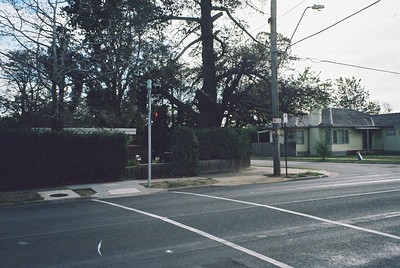Parallel Lines
I am finding that I am more and more involved in some of the many forms that the Internet takes (or is it that it is becoming more involved with me). I recently got onto Facebook as a way of keeping track of my travelling sibling Lukas (who seems to be spending time traversing zip-lines in the canopy of Thai forests). And once one is there one starts interacting with other friends and acquaintances. And so it has been this way a number of times now - I have followed friends or loved-ones onto particular sites and then get stuck there. And then I experience an interesting phenomena - that of communicating in parallel lines.
What am I saying? Well there is one friend recently that I will talk with on the landline phone and exchange some mobile texts with and have some long multi-topic conversations with on email and have some much shorter and more one-track exchanges with via a networking site. And in all these different lines very rarely do topics cross from medium to medium.
Naturally some media lend themselves to different levels of communication than others - texting is very limited by both the cost and the size of the keypad and the number of fingers one can effectively use. So texting messages tend to be short and pithy and fun (or totally functional and intended just to confirm plans). In contrast an email can go on for pages and cover all sorts of ground in wonderful complexity. But still I wonder why is it that topics seem to be quarantined within one line of conversation and rarely cross into the other? It seems to almost be some form of etiquette. Or is it just me?
A result of these parallel (non-intersecting) lines is that I can sometimes lose track of what I have discussed with someone and it can sometimes even feel as if my interaction with one person is a number of distinct interactions. Does contemporary communications technology lend itself to the more multi-faceted personal presentation?
What am I saying? Well there is one friend recently that I will talk with on the landline phone and exchange some mobile texts with and have some long multi-topic conversations with on email and have some much shorter and more one-track exchanges with via a networking site. And in all these different lines very rarely do topics cross from medium to medium.
Naturally some media lend themselves to different levels of communication than others - texting is very limited by both the cost and the size of the keypad and the number of fingers one can effectively use. So texting messages tend to be short and pithy and fun (or totally functional and intended just to confirm plans). In contrast an email can go on for pages and cover all sorts of ground in wonderful complexity. But still I wonder why is it that topics seem to be quarantined within one line of conversation and rarely cross into the other? It seems to almost be some form of etiquette. Or is it just me?
A result of these parallel (non-intersecting) lines is that I can sometimes lose track of what I have discussed with someone and it can sometimes even feel as if my interaction with one person is a number of distinct interactions. Does contemporary communications technology lend itself to the more multi-faceted personal presentation?
Labels: Internet Observations


